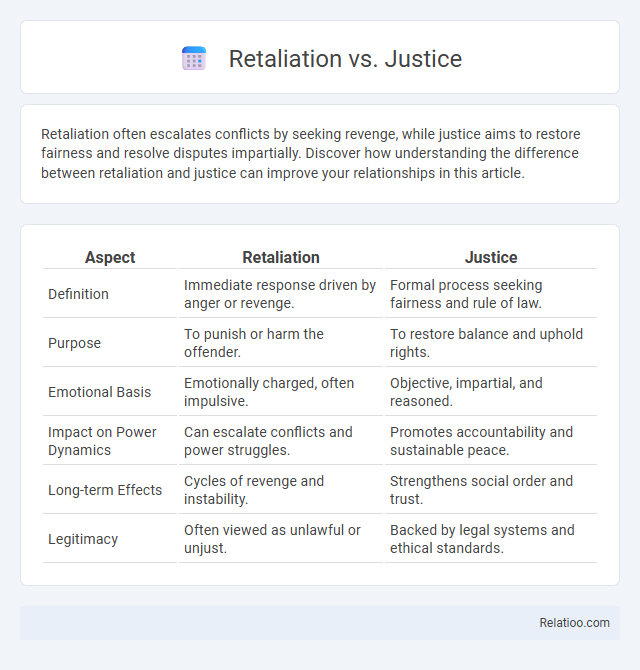Retaliation often escalates conflicts by seeking revenge, while justice aims to restore fairness and resolve disputes impartially. Discover how understanding the difference between retaliation and justice can improve your relationships in this article.
Table of Comparison
| Aspect | Retaliation | Justice |
|---|---|---|
| Definition | Immediate response driven by anger or revenge. | Formal process seeking fairness and rule of law. |
| Purpose | To punish or harm the offender. | To restore balance and uphold rights. |
| Emotional Basis | Emotionally charged, often impulsive. | Objective, impartial, and reasoned. |
| Impact on Power Dynamics | Can escalate conflicts and power struggles. | Promotes accountability and sustainable peace. |
| Long-term Effects | Cycles of revenge and instability. | Strengthens social order and trust. |
| Legitimacy | Often viewed as unlawful or unjust. | Backed by legal systems and ethical standards. |
Understanding Retaliation: Definition and Origins
Retaliation refers to actions taken to inflict harm or punishment in response to a perceived wrong or injury, originating from primal instincts for self-preservation and balance in social dynamics. Unlike justice, which is based on impartial legal or moral principles aiming for fairness and resolution, retaliation often stems from emotional reactions seeking revenge or deterrence. Understanding retaliation requires examining its roots in human behavior and cultural contexts where immediate response to harm serves as a deterrent mechanism but risks perpetuating cycles of conflict.
The Meaning and Principles of Justice
Justice embodies fairness, impartiality, and the protection of rights within a legal or moral framework. Unlike retaliation, which seeks personal vengeance, justice aims to uphold societal order through evidence-based judgments and proportional responses. Your understanding of justice should emphasize its principles of equality, due process, and the pursuit of truth over emotional reactions or retribution.
Historical Perspectives: Retaliation and Justice Through Time
Historical perspectives reveal that retaliation often served as immediate, personal retribution rooted in tribal and feudal societies, while justice evolved as a formalized system designed to maintain social order and fairness. Ancient codes such as Hammurabi's Code illustrate early attempts to balance retaliation with proportional justice, emphasizing "an eye for an eye" to limit excessive vengeance. Over time, judicial systems emerged to replace individual retaliation with state-administered justice, aiming to deter violence and uphold collective societal rights.
Key Differences Between Retaliation and Justice
Retaliation involves personal revenge driven by emotions, often resulting in excessive or disproportionate responses, while justice is a systematic process aimed at fairness, accountability, and rule of law. Justice seeks to balance the interests of all parties through impartial investigation and appropriate sanctions, whereas retaliation is impulsive and focused on inflicting harm in response to a perceived grievance. The key difference lies in justice promoting social order and resolution based on evidence and principles, contrasting with retaliation's emphasis on personal vendetta without objective mediation.
The Psychological Motivations Behind Retaliation
Retaliation stems from deep psychological motivations such as the need to restore personal dignity and assert control after experiencing harm or injustice. Your desire for justice often reflects an intrinsic drive to balance perceived moral scales and achieve emotional closure. Understanding these motivations helps differentiate between constructive justice-seeking behaviors and destructive retaliatory actions driven by anger or hurt.
Justice Systems: Purpose and Function in Society
Justice systems serve to uphold fairness, protect rights, and maintain social order by impartially resolving disputes and deterring wrongdoing. Unlike retaliation, which is driven by personal vengeance and can perpetuate cycles of violence, justice systems aim to provide structured, lawful consequences that promote rehabilitation and societal harmony. Your understanding of these distinctions is crucial in appreciating how justice systems function to balance individual accountability with collective well-being.
Outcomes of Retaliatory Actions vs. Just Responses
Retaliatory actions often escalate conflicts, resulting in negative outcomes such as prolonged disputes, emotional harm, and damaged relationships. Just responses prioritize fairness and accountability, fostering resolution, trust, and constructive dialogue. Your approach to conflict can significantly influence whether outcomes lead to healing or ongoing discord.
Ethical Implications: Morality in Justice and Retaliation
Justice emphasizes fairness and impartiality, ensuring moral accountability without personal bias, while retaliation often involves personal vengeance driven by emotional responses. Ethical implications arise as justice upholds societal order through legal systems, whereas retaliation risks perpetuating cycles of harm and undermining moral principles. Your understanding of these distinctions is crucial to fostering a fair and ethical resolution in conflicts.
Case Studies: Real-World Examples of Retaliation and Justice
Case studies of retaliation and justice reveal contrasting outcomes where victims either face further harm or receive rightful redress. Real-world examples, such as whistleblowers exposed to workplace retaliation versus individuals obtaining legal justice through courts, illustrate the impact of these dynamics on personal and professional lives. Your understanding of these cases highlights the importance of protecting rights and ensuring accountability for fair resolution.
Building a Society Focused on Justice Over Retaliation
Building a society focused on justice over retaliation requires establishing fair legal frameworks that prioritize rehabilitation and restitution rather than vengeance. Emphasizing restorative justice programs fosters community healing, reduces recidivism, and promotes social equity by addressing the root causes of conflict. Policies centered on impartial enforcement and protection of human rights create an environment where trust in institutions replaces cycles of retaliation.

Infographic: Retaliation vs Justice
 relatioo.com
relatioo.com